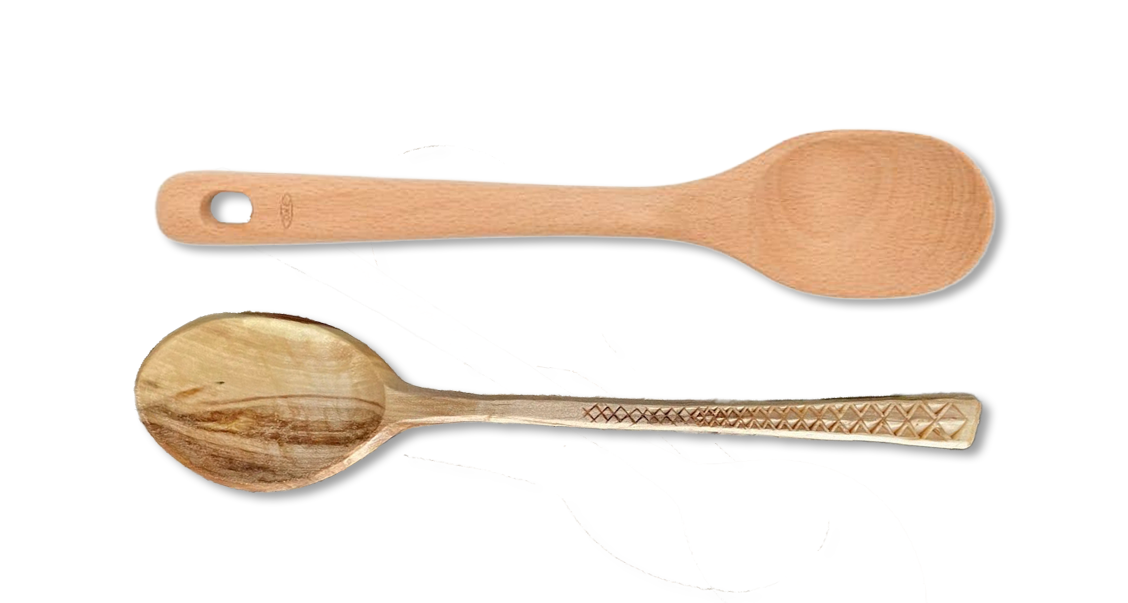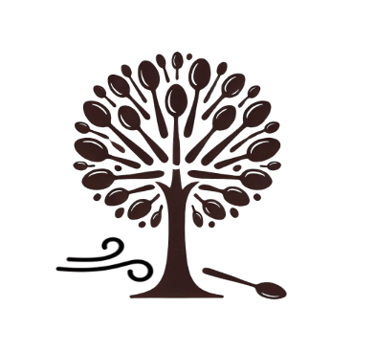Mass-Produced vs. Handmade: What a Wooden Spoon Can Teach Us
There was a time when every object had a story. Hand-carved spoons still do.
BACKGROUND & HISTORY
6/29/20253 min read


In a world full of mass production, it’s easy to forget where things come from. Take a moment to look at the wooden spoon in your kitchen drawer. Chances are, it was machine-cut from some generic hardwood, cranked out by the thousands in a factory you’ll never visit, in a country you’ve never been to. But to me, something as simple as a spoon can be something more—an object of intention, of artistry, of story.
How factory-made spoons are produced
The typical factory-made wooden spoon is produced at scale, often overseas where labor and material costs are low. These spoons are usually made from fast-growing, inexpensive woods like beech, rubberwood, or birch—species that are widely available and easy to machine. They're selected less for beauty or strength and more for uniformity and price.
The production process is highly automated: lumber is milled into blanks, routed into spoon shapes by CNC machines, then roughly sanded and tumbled in vats to smooth the surface. Some may be treated with food-safe mineral oil; others are coated in synthetic finishes that help them resist wear—at least for a while.
As for cost breakdown? A $20 spoon from a big-box store might include:
$1.00 for raw materials
$2.00 for factory labor
$3.00 for shipping across the ocean and import taxes
$5.00 for distributor and wholesale markup
$9.00 for retail markup
Very little of that money goes into craftsmanship, and even less goes to the people actually making the spoon. Quality control is often minimal. And while these spoons may do the job for a time, they’re not built to last—or to be cherished.
The hand-carved alternative
A hand-carved spoon, on the other hand, is born from a much slower rhythm. My spoons begin as branches that have fallen in storms—local hardwoods like maple, cherry, or walnut gathered from the forests and yards around where I live. Each piece is chosen for its unique shape, grain, and character—not because it’s the same as all the others, but because it’s different.
From there, the process is entirely human. Axes, carving knives, gouges, and bent knives do the work that machines never could. Each spoon takes hours to lovingly shape, sand, and finish by hand. No two are ever quite the same, because no tree is, either.
My prices reflect this. A $35 Spoonweather spoon includes:
$0 in imported materials (I use only local, fallen wood)
$0 in industrial processing
$0 in global shipping
Instead, it includes ~2-3 hours of careful labor by one artisan, fair compensation for that labor, some all-natural finishing supplies, and the intangible value of something made with care.
Yes, it costs more than a mass-made spoon. But that cost is an investment—in sustainability, in story, in soul.
Why I believe craftsmanship still matters
In a time when you can have almost anything shipped to your door within 24 hours, we’ve grown detached from how things are made and where they come from. We've forgotten that not everything has to be fast, cheap, or disposable.
When you hold a hand-carved spoon, you feel the difference immediately. The way the curve fits your thumb, the balance in your hand, the way the hand-carved tool marks catch the light—it’s not an accident. It’s the result of time, skill, and attention. That’s what craftsmanship means: the care of hands, the eye for detail, the patience to do it right.
More than that, a carved spoon is a reminder. Of the woods it came from. Of the human who shaped it. Of the idea that useful things can also be beautiful.
In the words of poet Mary Oliver, whose work so often reminds us to pay attention:
Carving spoons is my way of “telling about it.” A wooden spoon might seem small, but to me it is a window to something bigger: to nature, to artistry, to connection, and to a slower way of living. When we surround ourselves with handmade things, I believe we see the world differently—not just for what it produces, but for what it creates.
Ready to bring a little wonder into your kitchen drawer?
Every Spoonweather spoon is a unique, functional sculpture—born from storm-fallen wood, carved by hand, and meant to last a lifetime. They aren’t just spoons. They’re stories you can stir with.
Check out my shop to see more or to pick one up for yourself!
“Instructions for living a life:
Pay attention.
Be astonished.
Tell about it.”
— Mary Oliver, from “Sometimes”
Spoonweather
Hand carved wooden spoons honoring local trees and community. Made in the USA .
© 2025. All rights reserved.
Learn more
Navigate
Connect

Needham, MA
